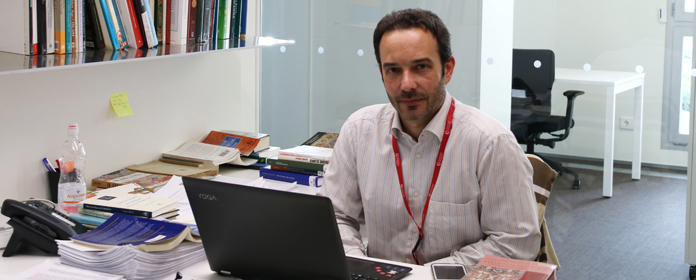Analizar la historia islámica para comprender qué dice el Corán sobre la violencia contra los no musulmanes
Marco Demichelis, investigador Marie Curie del ICS, ha realizado durante el curso 2017-2018 dos estancias en centros de prestigio de Francia y Alemania

FOTO: Isabel Solana
No se puede comprender qué dice el Corán sobre la violencia contra los no musulmanes sin analizar la historia islámica. Con el objetivo de realizar una investigación rigurosa, que ayude a interpretar los versos a la luz de este contexto histórico, el investigador Marco Demichelis, del proyecto ‘Religión y sociedad civil’ del Instituto Cultura y Sociedad (ICS), ha realizado dos estancias de investigación en centros de prestigio de Alemania y Francia.
Demichelis, que se incorporó al ICS en junio de 2017 gracias a una beca Marie Curie de la Comisión Europea, se centra en dos momentos históricos: los primeros siglos del Islam (siglos VII-IX) y la época contemporánea.
Para desarrollar esta investigación y comprender nuevos puntos de vista, el investigador del ICS realizó una estancia de investigación en el Instituto de Estudios Orientales de la Universidad de Bamberg (Alemania). De octubre a diciembre de 2017 trabajó con el profesor Patrick Franke, especialista en la primera historia islámica y en lectura del Corán. Franke le ofreció consejos y una metodología para desarrollar el análisis de los textos coránicos.
Por otro lado, el investigador del ICS trata de comprender e interpretar cómo esta visión de la violencia en el Corán ha llegado a cobrar tanta importancia en la sociedad actual. En este caso, ha podido comprobar de primera mano la situación de los musulmanes en Europa gracias a una segunda estancia la Universidad Católica de Lyon (Francia), donde ha trabajado con un grupo interreligioso.
En Lyon analizó cómo afecta esta narrativa de violencia a la sociedad francesa. “La violencia islámica tiene un gran impacto en la sociedad a través de la radicalización de personas, especialmente en los barrios de extrarradio”, lamenta.
Expone que esto sucede por la política de integración francesa que, por un lado, solo tiene en cuenta parcialmente la procedencia o religión de sus ciudadanos –existen muchos inmigrantes e hijos de inmigrantes del norte de África– y, por otro, indica que “sus ideales de ‘libertad, igualdad y fraternidad’ no se cumplen en la práctica, creando incoherencias sociales que alimentan la radicalización”. Asegura que la política francesa de asimilación de inmigrantes como ciudadanos no supone una libertad de expresión efectiva ya que “su ideología republicana no considera las necesidades religiosas de sus ciudadanos”.
Una vez finalice su proyecto en el ICS, Demichelis recogerá en un libro sus conclusiones sobre las narrativas de violencia en el Islam. Una de ellas es que las primeras conquistas árabes no se pueden considerar islámicas, ya que todavía no se había constituido la religión como tal.
Según afirma, esta idea es posterior y ha surgido en gran parte de la narrativa mediática que trata de “oponer Occidente y Oriente y mostrar la supremacía blanca norteamericana”. Como respuesta a este “post-colonialismo”, el mundo islámico recurre a la violencia contra los no musulmanes “usando una narrativa de confrontación; también está presente en el Corán, pero sin una comprensión efectiva de esta desde un punto de vista histórico-crítico”, puntualiza.




